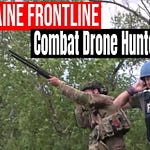In my latest video, I took a deep dive into Russian Foreign Minister Sergey Lavrov’s recent speech in Doha, Qatar. The speech has stirred considerable discussion, particularly regarding Russia’s stance on the ongoing war in Ukraine. Lavrov’s remarks have been interpreted by some as a declaration that the conflict will not end anytime soon, contradicting statements from figures like U.S. President Donald Trump, who has claimed he could bring the war to a swift conclusion.
What Did Lavrov Actually Say?
After closely analyzing the speech, as well as reviewing the official transcript from the Russian Ministry of Foreign Affairs, it’s clear that Lavrov did not explicitly state that the war would continue indefinitely. However, he did reaffirm that Russia has no intention of giving up the territories it has incorporated under Russian law.
Lavrov emphasized that Donetsk, Lugansk, Zaporozhye, and Kherson are legally considered part of Russia, according to Russian law. This has been a consistent stance for years, and as I have reported extensively, Russia sees these regions as non-negotiable. Regardless of what NATO, Ukraine, or Western nations claim, Moscow views these areas as sovereign Russian territory.
Russia’s Position on the Front Lines
Lavrov addressed the idea that the current front lines could be “frozen,” with Russia and Ukraine maintaining control over their respective territories as they stand today. He dismissed this notion outright, stating:
"Some people say, ‘Let’s leave the engagement line—this is Russian, and this is Ukrainian.’ First of all, this is not going to happen. We have a constitution based on the will of the people."
This statement aligns with what I’ve witnessed on the ground. Russian forces continue to push in several key region, and the idea of simply halting advances is not on the table.
Ukraine’s Role and European Influence
Another key takeaway from Lavrov’s speech was his criticism of European policies regarding Ukraine. He accused European leaders of continuously fueling the conflict. According to Lavrov, Europe is not interested in a peaceful resolution and instead seeks to prolong hostilities.
He pointed out that:
"Europe swiftly attempts to undermine any peace efforts by announcing substantial new packages of military aid to Kyiv. They incite Ukraine to continue hostilities."
This aligns with the recent wave of military support sent to Ukraine, including new weapons packages from the U.S. and EU.
Potential Deployment of European Peacekeepers
Lavrov also addressed the possibility of European peacekeepers being deployed to Ukraine—a topic that has been floated by some Western politicians. His response was unequivocal:
"We cannot and will not consider any such options… But nobody consulted us on the matter."
Essentially, Russia rejects any notion of foreign peacekeepers stepping onto Ukrainian territory, viewing it as a direct challenge to Russian sovereignty.
Russia and the United States: Upcoming Diplomatic Talks
Interestingly, Lavrov also revealed that Russia and the United States will hold a meeting in Istanbul on February 27 to discuss diplomatic issues, specifically the functioning of embassies. This meeting is particularly significant given the deteriorating state of diplomatic relations between Moscow and Washington.
As someone who has spent years covering this conflict, I can confirm that U.S.-Russia embassy relations have been at a near standstill. The U.S. embassy in Moscow has been running on skeleton staff for years, making it difficult for citizens of both countries to handle basic visa and consular issues. Lavrov hinted that improving diplomatic conditions for ordinary people is a priority.
Ukraine’s "Racist Laws" and Russian-Speaking Populations
Another significant part of Lavrov’s speech was his reference to Ukrainian laws affecting Russian-speaking populations. He stated:
"Whatever remains of Ukraine should also be freed from racist laws."
Lavrov was referring to policies implemented by the Ukrainian government that restrict the use of the Russian language. Ever since the 2014 Maidan uprising, Ukraine has moved to eliminate Russian as an official language, despite the fact that large portions of its population—speak Russian as their first language. This has been a key justification for Russia’s involvement in the war.
Many people in Donetsk and Luhansk have long considered themselves more Russian than Ukrainian, and this tension played a major role in the original 2014-2022 conflict.
Frozen Russian Assets: A Bargaining Chip?
Lavrov also touched on the issue of frozen Russian assets, which Western countries seized as part of sanctions against Moscow. He indicated that these assets are a potential negotiation point in any future peace talks. However, he made it clear that Moscow is not backing down on territorial claims, saying:
"I have no doubts that this issue will not disappear as part of the settlement."
In other words, Russia may be open to negotiations regarding sanctions and frozen assets, but not on giving up land.
Foreign Investment in Russian Territories
Finally, Lavrov addressed foreign investment in Russia’s newly acquired territories, particularly in relation to rare earth minerals. He echoed President Vladimir Putin’s invitation for foreign investors to collaborate on extracting these resources. However, he made it clear that any deals must respect Russia’s constitutional claim over these regions.
This puts Western investors in a tough position—do they acknowledge Russia’s territorial claims in order to access rare earth minerals, or do they refuse and miss out on valuable resources?
Final Thoughts
This speech was a reaffirmation of Russia’s stance on the war:
Russia will not surrender any territories it considers part of the Federation.
The front lines will not be frozen—military operations will continue.
Western military aid fuels the war, making peace less likely.
Russia is open to negotiations, but not at the cost of territorial concessions.
Frozen assets and diplomatic talks remain key bargaining points in the broader conflict.
As always, I will continue bringing on-the-ground reports and in-depth analysis from the conflict zone. I’ve been covering this war for over a decade, and I will remain in the field, delivering real, unfiltered journalism that major outlets won’t show you.
Stay tuned for more updates, and don’t forget to like, share, and support independent journalism!













Share this post